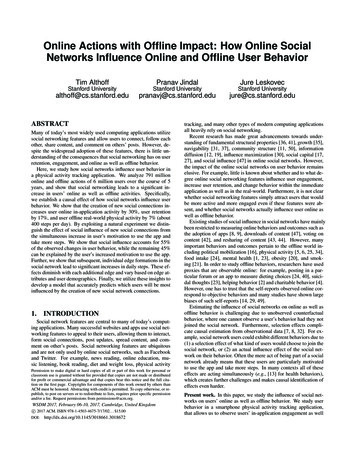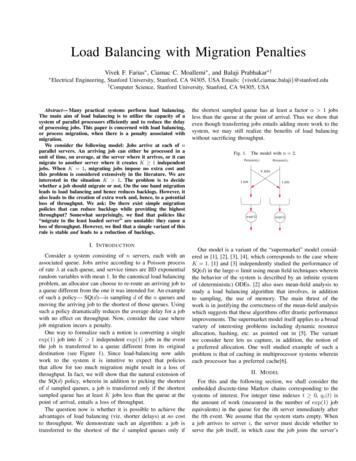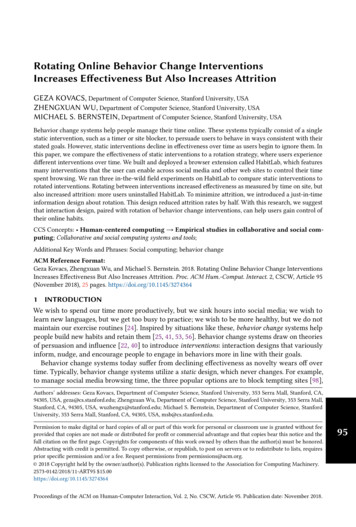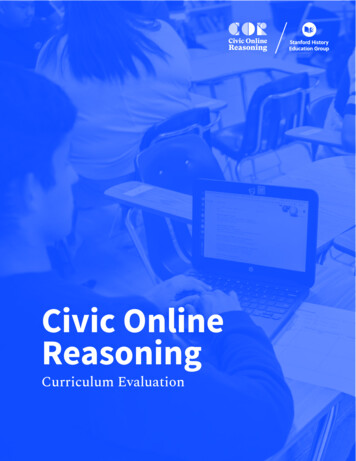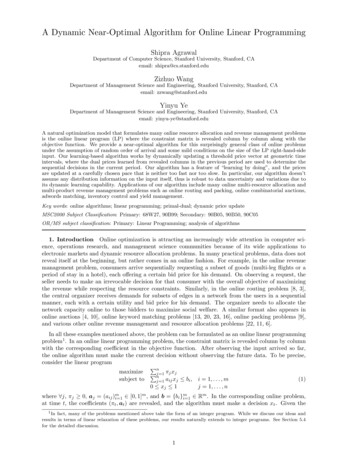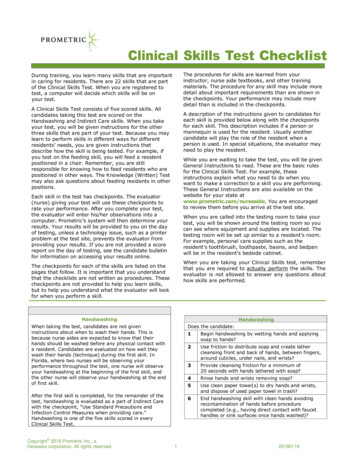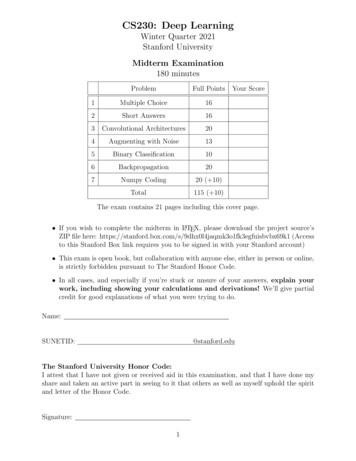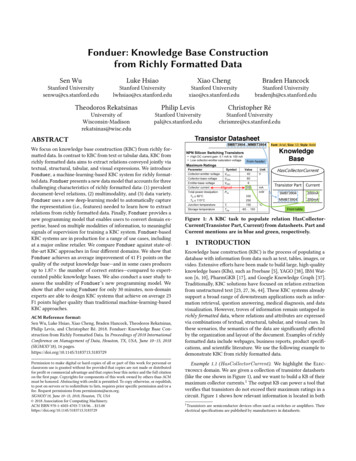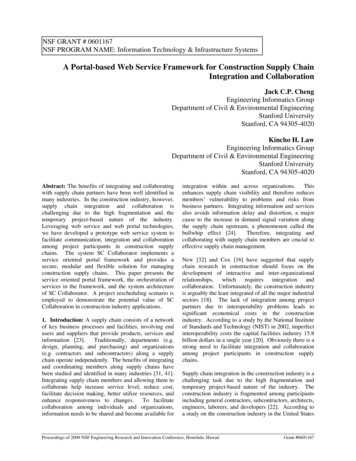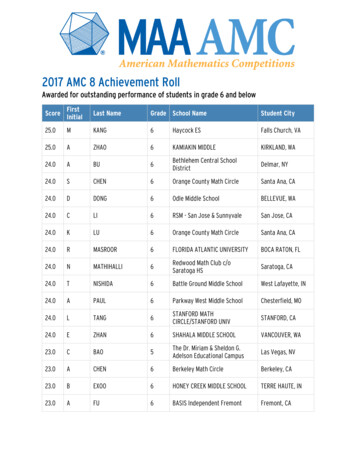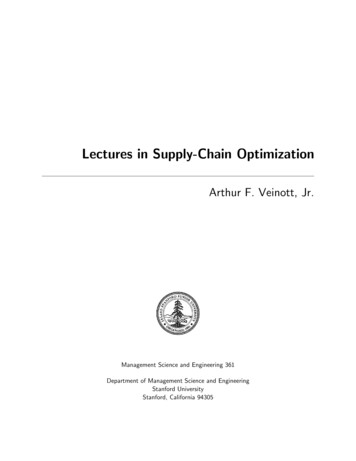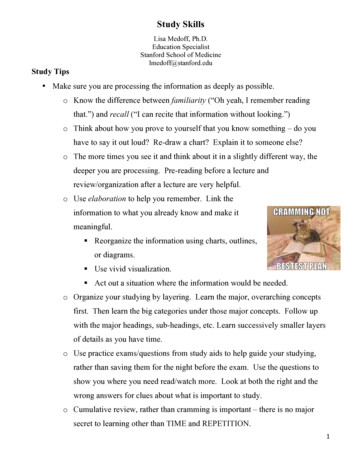
Transcription
Study SkillsLisa Medoff, Ph.D.Education SpecialistStanford School of Medicinelmedoff@stanford.eduStudy Tips Make sure you are processing the information as deeply as possible.o Know the difference between familiarity (“Oh yeah, I remember readingthat.”) and recall (“I can recite that information without looking.”)o Think about how you prove to yourself that you know something – do youhave to say it out loud? Re-draw a chart? Explain it to someone else?o The more times you see it and think about it in a slightly different way, thedeeper you are processing. Pre-reading before a lecture andreview/organization after a lecture are very helpful.o Use elaboration to help you remember. Link theinformation to what you already know and make itmeaningful.! Reorganize the information using charts, outlines,or diagrams.! Use vivid visualization.! Act out a situation where the information would be needed.o Organize your studying by layering. Learn the major, overarching conceptsfirst. Then learn the big categories under those major concepts. Follow upwith the major headings, sub-headings, etc. Learn successively smaller layersof details as you have time.o Use practice exams/questions from study aids to help guide your studying,rather than saving them for the night before the exam. Use the questions toshow you where you need read/watch more. Look at both the right and thewrong answers for clues about what is important to study.o Cumulative review, rather than cramming is important – there is no majorsecret to learning other than TIME and REPETITION.1
Reading Take care with highlighting. Rather than highlightingas you read, which can easily become mindless,highlight after you have finished a paragraph orsection. Take a minute to think about the mostimportant information and go back to highlight it. After finishing a section, think about some possible examYourtextbookshouldnotlooklikethis!questions that might be asked about that section. Try to predict how the questionmight be worded, what the correct answer would be, and what misleadinganswers would be.Lectures Prepare in advance to get the most out of lectureso Pre-read by looking over the major concepts. Pre-reading shouldinvolve a basic skimming of the material and take about 10-15 minutes.o Try to get a basic understanding of new words/ideas.o Think about what might be most difficult to understand in lecture andwhere you will really need to pay attention.o Have an idea of what your notes will look like ahead of time. How will notes be organized? Will you try to write everything down or try to pull out only themost important information? During lectureo Sit where distractions will be minimized(e.g. looking at what others are doing;temptation to check email).o If you are not feeling focused or find asection difficult to understand, make sureto note where you stopped paying attentionso you can go back to it later.2
o Briefly review notes within a day or two Mark what was clear and what needs clarification Reorganize , restate, reformat – this will help you process at adeeper level. Integrate/cross-reference notes with previous lectures, books,other study aids.o Think about your own personal learning style – do you get more out oflecture if you read beforehand, or do you get more out of reading if youhear the lecture first?Study Atmosphere Know where you learn best.o Do you need absolute silence or a bit of noise?o Do you need to go somewhere or is studying in yourroom best? Should you go to same place every day ordoes variety help?o Do you focus best sitting at a desk? On the couch? Walking around aroom? Writing on a large white board? Try not to use your bed forstudying so you can connect it only with relaxation.Social Studying Be thoughtful about whether you are the kind of person who studies betterwith others, and if so, whom those people might be. Your best friend is notnecessarily your best study partner. In fact, studying with someone who isquite different from you may yield better results because you will be getting anew perspective. Agree on the goals and norms of the partnership or group.o How much preparation is necessary? Are you learning together or areyou testing each other?3
o How will time be spent? Will you actually be going over materialtogether, or do you just need an accountability partner to check in with,but you do not actually want to talk? Check in periodically to make sure the partnership/group is still working foreveryone.Know What Your Body Needs While Studying When do you need to take a break? How often? Make sure that a break isreally a break. Get up, go outside, walk around. Keep track of when you get hungry and what you need to eat to give you anenergy boost so you can plan ahead with snacks and meal breaks. Note your caffeine intake. When do you need it the most? What is the idealamount but keep you alert, but not jittery? At what time of day do you need to stopdrinking caffeine so you can fall asleep easier?Plan Ahead for Difficulty Focusing Know what type of studying is best at different times of day. For example, ifyou are a morning person, study the hardest material in the morning and keepthe evenings for tasks that do not require a lot of attention, but will prepareyou for the following day, such as making flashcards or rewriting charts. Have strategies to ease yourself into studying when youjust do not feel like it or cannot focus. For example, if youcannot focus on reading, do not just sit there, stare at thebook, and mentally beat yourself up. Do something that isa bit easier or more enjoyable for you (in terms of studyactivity and/or content) and then try again in 30 minutes.Understand Your Learning Style(s) Some examples:o Visual/graphico Kinesthetic/movemento Auditoryo Interpersonalo Reading/writing4
Some websites that can help you in figuring out your learning style and howto match your studying to your needs:! http://www.varklearn.com/english/page.asp?p questionnaire! rning-styles-quiz! ssments/index.shtml Keep in mind that the more modalities youuse, the easier it will be to understand, store,and retrieve the information. For example,even if you are primarily an auditory learner,also try to integrate studying graphics oracting out the information. In addition, beflexible and willing to analyze yourstrategies; change them if they are not working. Give yourself time to adjustto new methods of studying.If you are concerned about mastering the material, don’t hesitate to ask for help. Ask earlyand ask often! Ask a variety of people for advice, and then follow what suits your needs.Professors, TAs, classmates, colleagues, professional mentors, advising deans, E4Cfaculty, and, of course, your Education Specialist, are great resources.Resource overview/5
o Use practice exams/questions from study aids to help guide your studying, rather than saving them for the night before the exam. Use the questions to show you where you need read/watch more. Look at both the right and the wrong answers for clues about what is important to study. o Cumulative review, rather than cramming is important – there is no major secret to learning other than TIME .File Size: 662KBPage Count: 5
